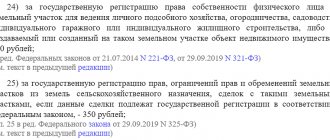Grounds for re-registration of property
Before we talk about re-registration of property, let us establish what ownership means. Civil legislation defines this as the right to use, as well as own and dispose of property. Thus, a person can do whatever he wants with his property - sell, donate, exchange, or even destroy, of course, if this does not cause damage to surrounding people and nature. Section 2 of the Civil Code (hereinafter referred to as the Civil Code of the Russian Federation) is devoted to this right.
Based on the provisions of the mentioned law, re-registration of ownership is nothing more than the transfer to another person of the right to dispose, own, use real estate or other property.
You may be interested in: what are the features of registering ownership of an apartment.
Sometimes it is enough to simply transfer the item to the new owner, and sometimes it is necessary to additionally draw up a written agreement. The latter is relevant for the transfer of ownership of an apartment. Based on the Civil Code of the Russian Federation, the Housing Code, laws regulating property relations, as well as the practice of lawyers, there are five ways to transfer an apartment to another person:
- Purchase and sale - the owner transfers the apartment to another person for a fee (Articles 549 - 558 of the Civil Code of the Russian Federation).
- Donation is a gratuitous transfer of property (Articles 572 – 582).
- Rent - a person undertakes obligations for the care and maintenance of the owner of the apartment or pays a certain amount during the period established by the agreement, and as a result receives it into ownership after the expiration of a certain time or the death of the owner (Articles 589 - 605).
- Exchange - in such a transaction, owners exchange property among themselves (Articles 567 - 571).
- Will - with this method, the apartment is transferred to the new owner after the death of the former owner and inheritance on the basis of a written order certified by a notary or a person specified in the law (Articles 1110 to 1175 of the Civil Code).
Agreements and transactions
1.1. Contract of sale of an apartment
This is the most commonly used method of re-registration of ownership of an apartment. The vast majority of transactions in the real estate market are carried out through the conclusion of a purchase and sale agreement. Under this agreement, one party (seller) undertakes to transfer ownership of the apartment to the other party (buyer), and the buyer undertakes to accept the apartment and pay a certain amount of money (price) for it. The main feature of this method of re-registration of ownership is the paid nature of the transaction: a sum of money determined by the parties must be paid for the apartment.
It should also be mentioned that some time ago, unscrupulous creditors practiced concluding agreements for the purchase and sale of an apartment under the guise of securing the seller’s obligations under a loan agreement: the owner of the apartment received a certain loan amount from a third party (individual or company) and, to ensure the repayment of the debt, “transferred” “pledge” of the apartment, but this “collateral” was formalized not by a mortgage agreement (real estate pledge agreement), as required by law, but by an apartment purchase and sale agreement. In fact, the owner of the apartment was selling the apartment to his creditor.
Some of these “sellers” managed to prove in court the invalidity of such apartment purchase and sale agreements to their creditors, and unscrupulous creditors were recognized as fraudsters. But, unfortunately, not everyone was able to return the apartments “mortgaged” in this way, because Formally, the purchase and sale agreement was concluded and executed by the parties; the former owners of the apartments were unable to provide evidence to the contrary. Be vigilant and do not repeat the mistakes of others.
It should be remembered that on income from the sale of an apartment that was owned by the seller for less than a certain period of time (as a general rule - 5 years, with the exceptions established in paragraph 3 of Article 217.1 of the Tax Code of the Russian Federation), you must pay personal income tax (13% - for residents of the Russian Federation with the right to apply tax deductions and 30% for non-residents without the right to apply tax deductions). Moreover, if the price of the apartment under the purchase and sale agreement is less than 70% of the cadastral value of the apartment, then when calculating the amount of sales tax, income will be recognized not as the price of the apartment from the contract, but as the monetary value obtained by multiplying the cadastral value of the apartment by a factor of 0.7 .
For example, if in 2021 a citizen of the Russian Federation who lives abroad most of the time (183 days or more per year) sells an apartment purchased in 2021, he will have to pay personal income tax (NDFL) in the amount of 30 % of the 2021 sales price (without deducting the amount for which the apartment was purchased in 2021). If the cost of an apartment is 10,000,000 rubles, the amount of tax payable will be 3,000,000 rubles.
If the seller is a tax resident (one who lives in Russia for 183 or more days a year), then personal income tax will be calculated differently: taxable income from the sale of an apartment will be the difference between the price under the 2021 contract and the price under the 2021 contract, and the tax rate will be 13%. If in 2019 an apartment cost 9,000,000 rubles, then the sales tax in 2021 will be 13,000 rubles ((10,000,000 – 9,000,000)*13%).
1.2. Barter agreement
Under an exchange agreement, each party undertakes to transfer ownership of an apartment to the other party in exchange for another apartment (or other thing). We can say that each of the parties will act as a seller in relation to one apartment, and as a buyer in relation to the other. Depending on the ratio of the cost of apartments, the exchange can be of two types: with an additional payment (if one apartment costs more than another, then one of the parties pays the difference to the other) and without it (the cost of the apartments is the same). For example, you want to sell your 3-room apartment and buy a 1-room apartment and get the difference between their prices and you have found a 1-room apartment whose seller wants to buy a 3-room apartment like yours.
In this case, you can transfer the apartments to each other in one of two ways: either by concluding two sales and purchase agreements, or by concluding one exchange agreement with the condition of additional payment of the difference. When choosing the last option for re-registration of ownership of an apartment, the settlement procedure will most accurately correspond to the essence of the transaction, and you also eliminate the situation in which the transfer of rights for one of the apartments will be registered, but not for the other. If the exchange agreement is invalidated or terminated, everyone will receive the apartment that previously belonged to them.
1.3. Donation agreement
Also called “deed of gift” in everyday life. As a rule, donation is made between relatives. Under a gift agreement, one party (the donor) transfers or undertakes to transfer ownership of the apartment to the other party (the donee) free of charge. The main feature of this type of agreement is the gratuitous nature of this agreement. If there is a counter-transfer of a thing, including money, or a right or a counter-obligation, the contract is not recognized as a gift, the transaction will be considered invalid (sham).
If the donor and the donee are family members and (or) close relatives in accordance with the Family Code of the Russian Federation (spouses, parents and children, including adoptive parents and adopted children, grandparents and grandchildren, full and half-blooded (having a common father or mother) brothers and sisters), then the apartment received as a gift is not subject to income tax for an individual. If the donor and the donee do not belong to the specified categories of relatives, then the donee must pay personal income tax on the value of the donated apartment, which is recognized as equal to the cadastral value.
Read our article about the difference between a deed of gift and a will for an apartment.
1.4. Rent agreement
Or lifelong maintenance with dependents. Under a rent agreement, one party (the rent recipient) transfers ownership of property, including an apartment, to the other party (the rent payer), and the rent payer undertakes, in exchange for the received apartment, to periodically pay rent to the recipient in the form of a certain amount of money or in another form. Under an annuity agreement, it is possible to establish the obligation to pay annuity indefinitely (permanent annuity) or for the life of the annuity recipient (lifetime annuity).
Lifetime annuity can be established on the terms of lifelong maintenance of a citizen with a dependent. This type of agreement must be notarized. It is most common among older citizens who require assistance. The ownership of an apartment in the name of the rent payer is registered during the life of the rent recipient (in contrast to the ownership rights acquired by inheritance).
An apartment alienated for payment of rent can be transferred free of charge or for a fee. In the first case, the rent payer periodically pays only rent, and in the second case, along with the periodic payment of rent, he must pay a certain amount for the apartment.
Rent is one of the types of encumbrance on property. If you decide to sell, donate or otherwise dispose of the apartment received under the rental agreement, your obligations as a rent payer are transferred to the new owner. In addition, the rent recipient acquires a lien on the apartment, which is also an encumbrance on the apartment, complicating subsequent transactions with him.
You should also pay attention to the fact that if the rent payer violates the obligations assumed, the rent agreement may be terminated, and the apartment transferred under it may be returned to the rent recipient. More details can be found here.
1.5. Compensation agreement
Compensation is not an independent transaction; it is one of the ways to terminate obligations. By agreement of the parties, the debtor's obligation may be terminated by providing the creditor with compensation, including an apartment. An agreement on compensation may provide for the provision of compensation (within the framework of this article - an apartment) both immediately at the time of concluding such an agreement, and in the future, and the parties can determine the amount of the obligation that is repaid by providing compensation, and the cost of the apartment transferred as compensation, as well as the procedure for paying the difference between the cost of the apartment and the amount of the existing debt.
According to the latest clarifications of the Supreme Court of the Russian Federation (for more details, see paragraph 2 - paragraph 9 of the Resolution of the Plenum of the Supreme Court of the Russian Federation dated June 11, 2020 No. 6 “On some issues of application of the provisions of the Civil Code of the Russian Federation on the termination of obligations”), if by agreement of the parties as The apartment has been transferred as compensation, but the debtor avoids registering the transfer of ownership of it; the creditor has the right to demand such registration (clause 1 of Article 6, clause 3 of Article 551, paragraph two of clause 1 of Article 556 of the Civil Code of the Russian Federation).
In other words, concluding a compensation agreement would be appropriate when the debtor, instead of repaying the debt, wants to re-register the apartment to his creditor. The conclusion of a compensation agreement is most relevant if there are legal relations between the debtor and the creditor arising from a loan (credit) agreement, but it is also permissible if the legal relationship between the debtor and the creditor has a different nature.
Re-registration procedure
Documents required for re-registration of an apartment:
- Passport;
- a document confirming the emergence of ownership rights (DCT, rent agreement, etc.);
- consent of the spouse, confirmed by a notary.
To re-register, you need to submit these documents to Rosreestr and write a corresponding application. Order of the Ministry of Economic Development of Russia dated November 26, 2015 No. 883 established that the collected package can be sent by Russian Post, through a representative, the online portal of State Services or the website of Rosreestr, MFC, or submitted in person to the branch of the registration authority. The applicant also needs to pay a state fee - 2,000 rubles.
After submitting the application, within 12 days the specialist will make a decision on registration or refusal (for example, due to an error in the execution of the contract), which can be appealed in court.
Thus, to re-register an apartment, it is necessary not only to draw up a written agreement, but also to prepare a package of documents and register the acquired property. Below we will look step by step at re-registering an apartment in different ways.
There is nothing complicated in the instructions provided, however, certain knowledge is required so that all actions and executed documents have legal force.
The process of re-registration of rights
Regardless of the specifics of the transaction, the algorithm for re-registering ownership to a new owner looks the same:
- An agreement appropriate to the situation is being prepared.
- They collect a package of documentation confirming the legitimacy of the transaction.
- The contract is certified by a notary, who will check the documents for the object.
- The package of collected documentation for the object and the parties to the contract are submitted to Rosreestr, having previously paid the state fee. In addition to Rosreestr, you can contact the nearest branch of the MFC, and if you are unable to be present in person, prepare a power of attorney to represent your interests by another person.
- After checking the papers, the registering authority makes changes to the database and issues a new extract from the Unified State Register of Entities recording the transfer of rights.
If difficulties arise with drawing up an agreement, contact a lawyer specializing in real estate or a notary. The waiting period for verification and registration of a new owner takes 12 days, but in a number of situations this period is reduced. If the inspection officer identifies errors and inconsistencies in the submitted documents, registration will be denied.
The decision of the registration authority is subject to judicial challenge if the applicant is confident that he is right.
List of papers for Rosreestr
Each situation is unique, and depending on what is being re-registered and on what grounds, there may be its own nuances.
- The procedure for registering an apartment purchase and sale transaction
But there is a mandatory list of what documents are needed to re-register an apartment by Rosreestrom:
- Civil documents of the parties (the former and new owners prepare passports for registering the sale and purchase; for unilateral transactions, the applicant’s passport is sufficient).
- Technical documentation is prepared for real estate, identifying a specific property, indicating individual parameters - cadastral passport, documents from the BTI.
- If there are other owners, the applicant first draws up and submits to Rosreestr a notarized consent to the transaction of the others.
- The registration fee for all types of property and circumstances of re-registration of ownership is 2 thousand rubles. Details for transfer are obtained from the MFC department, Rosreestr, or through the State Services website.
Purchase and sale
You can sell an apartment to absolutely any person or organization. To find a buyer, you can place an ad online or contact a real estate agent. Next, we presented instructions for independently conducting a transaction for a private apartment.
Step 1. Appraisal of the apartment.
Since the apartment lease transaction is of a paid nature, it is necessary to realistically assess its value. When selling, you can rely on the results of a cadastral valuation, but they do not always satisfy the owners or buyers of real estate. Therefore, it is worth contacting specialists to conduct an independent assessment of the apartment and determine its market value specifically for the period of sale.
Don't agree with the cadastral value of your property? Fill out the form to the right and our highly qualified attorney will tell you how to challenge the results of a government assessment.
Step 2. Prepare documents.
When buying an apartment with a registered child, the new owner takes on a big risk. Since he will not be able to discharge him without providing similar housing.
These documents are collected directly by the owner. The future owner should carefully study all the documents, and pay special attention to the USRN extract.
The buyer will only need a passport and the consent of the spouse.
Step 3. Draw up a policy statement.
This agreement is drawn up in simple written form, but in compliance with certain requirements. He contains:
- details of the seller, buyer;
- information about the apartment: address, location in the house, area, number of rooms;
- transaction price;
- payment method (cash, non-cash);
- payment method (one-time payment, installments);
- conditions for re-registration of ownership (after payment of the entire amount, after the first installment);
- rights, obligations of the parties to the contract;
- liability for breach of contract;
- additional conditions.
It is also necessary to draw up a transfer deed, which will be an annex to the agreement.
For the agreement, you will additionally need the buyer’s passport and the consent of the spouse (if he has one).
You can draw up this agreement yourself; notarized confirmation is not required, except in cases where one of the parties to the transaction is a minor child, incapacitated, the documents will be sent by mail, or when a share in the apartment is being sold.
Step 4. Register ownership.
Donation
You can transfer an apartment under a gift agreement to any persons, in particular, those who are not relatives. The deed of gift is gratuitous, so a real estate appraisal is not required; you can start immediately by preparing the necessary papers.
Step 1. Prepare documents.
To draw up a deed of gift, you will need the same list of papers as for the DCT.
Step 2. Draw up a deed of gift.
This act of will must be drawn up only in writing. There are no special requirements for the structure. But the deed of gift must contain:
- details of the parties;
- information about the apartment;
- rights, obligations of the donor and the donee;
- liability for breach of contract.
The need for notarization arises in the same situations as with DCT.
Step 3. Rewrite the apartment.
Rent
The legislation allows for the transfer of ownership under a rent agreement for a fee or free of charge. In the first option, the agreement specifies a condition for the periodic transfer of funds to the owner during his life (lifetime annuity) or indefinitely (permanent). And in the second there is a condition on the provision of services and the fulfillment of certain obligations - lifelong maintenance with dependents.
Does the rent recipient continue to live in the re-registered apartment? Write to our legal adviser by filling out the form on the right, and he will definitely help you solve the problem.
If the agreement contains a condition for payment, then the rules of the monetary contract apply to it, and if the transfer of property is free, the gift agreement applies. However, annuity is not one of these contracts.
You may be interested in the apartment rental agreement and its features.
Step 1. Prepare documents.
The package of documents for an annuity agreement does not differ from the DCP.
Step 2. Draw up an agreement.
The rent must also be drawn up only in writing and must be certified by a notary. Otherwise, the agreement will not have legal force. It includes:
- data of the parties;
- information about the apartment;
- rights, duties, responsibilities;
- additional conditions.
Step 3. Rewrite the apartment.
How to transfer an apartment to another person by making a will
Re-registering an apartment to another person under a will will not be difficult, since the heirs (future owners) are indicated in the will certified by a notary. The heir can take ownership of his property only six months after the death of the owner of the apartment. A six-month period is established so that all heirs can declare their rights during this time. If problems arise with determining an heir, you have to go to court. The decision on inheritance of property can only be made by the court. Having received a court decision, it should be attached to the main package of documents (
Exchange
In practice, apartment exchanges often occur within the same city, region or even country. It can be either without additional payment or with additional payment.
Step 1. Prepare documents.
For exchange, both parties to the transaction collect a package of documents for each subject of the contract, as in the case of purchase and sale.
Step 2. Draw up an agreement.
The peculiarity of this agreement is that the parties to the transaction act as a seller and a buyer at the same time. The agreement contains the same conditions as the above agreements. Notarization is not necessary; the contract can be certified at the request of the parties.
Step 3. Rewrite the apartment.
Registration deadlines
The duration of registration of ownership of an apartment depends on the type of transaction concluded and the method of submitting documents. The timing is approximately as follows:
- 1 day - if the application is sent electronically;
- 3 days - if a contract of sale, gift, etc. certified by a notary;
- 5 days - if ownership has arisen by a court decision or mortgage documents have been submitted;
- 7 days - if documents are submitted to the Rosreestr division;
- 9 days - if the papers are submitted to the MFC.
In all the above cases, not calendar days are meant, but working days.
Will
The peculiarity of a testamentary disposition is that it comes into force only after the death of the owner. It also has an advantage over inheritance by law.
Step 1. Prepare documents.
To draw up a will, it is enough for the owner of the apartment to provide a passport and title documents for the apartment.
Step 2. Make a will.
To draw up a will, you must contact a notary or other authorized person. For example, if a person is in a hospital, then the head physician can certify the “last will”.
When receiving an apartment under a will, the heir acts as follows:
- Collects documents.
To receive an inheritance you must provide:
- heir's passport;
- testator's passport;
- original will;
- certificate of ownership in the name of the testator;
- extract from the Unified State Register of Real Estate.
- Presents documents to the notary.
To re-register the apartment in his name, the heir needs to obtain a certificate of inheritance. To do this, the documents indicated above are transferred to the notary for examination.
- Pays the state fee.
After reviewing the documents, the heir receives a payment order to pay the state fee. For children, spouse and parents of the testator, the payment amount is 0.3% of the value of the inherited property, and for other categories - 0.6%.
- Receives a certificate.
Having paid the fee, the heir receives a certificate of the right to inheritance - the basis for re-registration of the apartment.
- Registers property rights.
You may also be interested in: how to challenge a will for an apartment.
How much does it cost to change ownership and where is it cheaper to arrange it?
Re-registration of ownership of real estate is a paid procedure.
You need to know how much it costs to re-register an apartment for another person. This will allow you to prepare for financial expenses in advance. A state fee is charged for the re-registration of housing ownership rights in Rosreestr and the MFC. The current fee for individuals is 2,000 rubles (clause 22 of Article No. 333.33 of the Tax Code of the Russian Federation). When contacting private companies, you will have to pay more: in addition to the fee, money is charged for the work of a specialist.
Thus, the basis for re-registration of rights to real estate to another person is a transaction under a purchase and sale agreement. But this is unprofitable financially, since the recipient of the money for housing will have to pay income tax. Therefore, contracts of exchange, donations, and wills are often drawn up. Re-registration of property rights is carried out in Rosreestr or MFC.
Dear readers, the information in the article may be out of date, take advantage of a free consultation by calling: Moscow +7
, St. Petersburg
+7 (812) 425-62-38
, Regions
8800-350-97-52











